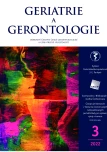The effect of higher carbohydrate intake on plasmatic glucose levels in patients in after care
Authors:
Marie Tichá 1; Ondřej Sobotka 1; Petr Adámek 2; Lenka Poláková 2; Markéta Kubíčková 1; Luboš Sobotka 1
Authors‘ workplace:
III. interní gerontometabolická klinika LF UK a FN Hradec Králové
1; Levitovo centrum následné péče, Hořice
2
Published in:
Geriatrie a Gerontologie 2022, 11, č. 3: 105-108
Category:
Original Article
Overview
Loss of body muscle is especially common in hospitalized elderly people. At the same time, type 2 diabetes is common in these patients with a recommended reduction in dietary carbohydrate intake. However, carbohydrate intake is necessary to induce an anabolic situation and subsequent improvement of the patient‘s condition during recovery; on the other hand, it is limited in the elderly due to the fear of decompensation. The aim of our prospective study was to determine to what extent increased carbohydrate intake affects the 24-hour glycaemic profile in elderly patients with type 2 diabetes admitted to aftercare beds. Fourteen type 2 diabetic patients were enrolled in this prospective study. During the first week, they received a standard hospital diabetic diet containing 250 g of carbohydrate. In the following week, 50 g of maltodextrin was added to each main meal - the total carbohydrate intake was 400 g per day. For both weeks, patients‘ blood glucose was monitored using a subcutaneous sensor. The addition of 150 g of maltodextrin led to rises in glycaemia after its administration. This rise was most pronounced in the first half of the week (days 1 to 3). There was a decrease in glycaemia in the subsequent period. No patient required a change in diabetic treatment, nor was there any decompensation. Our study suggests that carbohydrate restriction should be re-evaluated, especially in the elderly who need nutritional support.
Keywords:
geriatric patient – Carbohydrates – insulin resistance – anabolism
Sources
- Sobotka L, Sobotka O. The predominant role of glucose as a building block and precursor of reducing equivalents. Curr Opin Clin Nutr Metab Care 2021; 24 : 555–562.
- Soeters PB, Shenkin A, Sobotka L, et al. The anabolic role of the Warburg, Cori-cycle and Crabtree effects in health and disease. Clin Nutr 2021.
- Hammad N, Rosas-Lemus M, Uribe - -Carvajal S, et al. The Crabtree and Warburg effects: Do metabolite - -induced regulations participate in their induction? Biochim Biophys Acta 2016; 1857 : 1139–1146.
- Xiao W, Wang RS, Handy DE, Loscalzo J. NAD(H) and NADP(H) Redox Couples and Cellular Energy Metabolism. Antioxid Redox Signal 2018; 28 : 251–272.
- Cho ES, Cha YH, Kim HS, et al. The Pentose Phosphate Pathway as a Potential Target for Cancer Therapy. Biomol Ther (Seoul) 2018; 26 : 29–38.
- Petersen MC, Shulman GI. Mechanisms of Insulin Action and Insulin Resistance. Physiol Rev 2018; 98 : 2133–2223.
- Noba L, Wakefield A. Are carbohydrate drinks more effective than preoperative fasting: A systematic review of randomised controlled trials. J Clin Nurs 2019; 28 : 3096–3116.
- Barazzoni R, Deutz NEP, Biolo G, et al. Carbohydrates and insulin resistance in clinical nutrition: Recommendations from the ESPEN expert group. Clin Nutr 2017; 36 : 355–363.
- Berger MM, Pantet O, Jacquelin - -Ravel N, et al. Supplemental parenteral nutrition improves immunity with unchanged carbohydrate and protein metabolism in critically ill patients: The SPN2 randomized tracer study. Clin Nutr 2019; 38 : 2408–2416.
- Soeters MR, Soeters PB. The evolutionary benefit of insulin resistance. Clin Nutr 2012; 31 : 1002–1007.
- Nygren J, Thorell A, Ljungqvist O. Preoperative oral carbohydrate therapy. Curr Opin Anaesthesiol 2015; 28 : 364–369.
- Skorepa P, Sobotka O, Vanek J, et al. The Impact of Glucose-Based or Lipid-Based Total Parenteral Nutrition on the Free Fatty Acids Profile in Critically Ill Patients. Nutrients 2020; 12.
Labels
Geriatrics General practitioner for adults Orthopaedic prostheticsArticle was published in
Geriatrics and Gerontology

2022 Issue 3
- Advances in the Treatment of Myasthenia Gravis on the Horizon
- Memantine in Dementia Therapy – Current Findings and Possible Future Applications
- Memantine Eases Daily Life for Patients and Caregivers
- Possibilities of Using Metamizole in the Treatment of Acute Primary Headaches
- Metamizole at a Glance and in Practice – Effective Non-Opioid Analgesic for All Ages
-
All articles in this issue
- The effect of higher carbohydrate intake on plasmatic glucose levels in patients in after care
- Profile of non-vaccinated seniors with COVID-19 hospitalized during the third pandemic wave
- Practical approach for identifying a forgetful patient using cognitive tests Amnesia Light and Brief Assessment (ALBA) and Picture naming and immediate recall (PICNIR) for a very quick evaluation of not only memory
- Sleep disorders in the elderly
- Immobilization syndrome in neurogeriatric rehabilitation
- Ohlédnutí za 27. ročníkem Celostátního gerontologického kongresu, 27.–28. dubna v Hradci Králové
- Editorial
- Geriatrics and Gerontology
- Journal archive
- Current issue
- About the journal
Most read in this issue
- Sleep disorders in the elderly
- Practical approach for identifying a forgetful patient using cognitive tests Amnesia Light and Brief Assessment (ALBA) and Picture naming and immediate recall (PICNIR) for a very quick evaluation of not only memory
- Immobilization syndrome in neurogeriatric rehabilitation
- The effect of higher carbohydrate intake on plasmatic glucose levels in patients in after care
